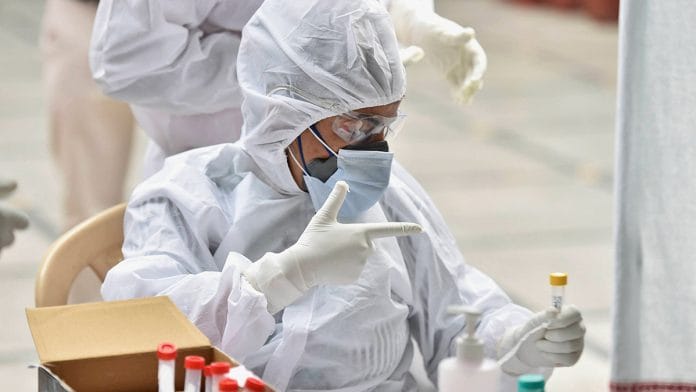New Delhi: The coronavirus pandemic has driven scientists around the world to find new ways of fighting Covid-19, even as understanding about the virus evolves every day.
Here are some of the latest scientific developments in the fight against SARS-CoV-2.
Sensor to help smartphones detect coronavirus in 60 seconds
Scientists from the University of Utah in the US have developed a portable and reusable sensor, that can be paired with a smartphone, that can detect coronavirus from saliva samples in just 60 seconds.
About the size of a quarter, this sensor is based on a technology that was developed by the same team to detect the Zika virus.
The sensor uses single-strand DNA called aptamers that would attach to proteins in the Covid-19 virus. Users will have to plug the small sensor into a cellphone and launch an app made for the device.
To test for the presence of virus, the user would place a drop of saliva on the sensor, and the results would appear on the phone.
Viruses on surface tops can also be detected by brushing a swab on a particular item and then on the sensor. It may also be able to detect the presence of Covid-19 in floating microscopic particles inside enclosed spaces, such as elevators, the researchers have said.
If Covid-19 is present, the DNA strands in the sensor would bind to the virus’ proteins and an electrical resistance is measured in the device, signaling a positive result.
The sensor would include an array of tiny devices inside it, each with a DNA strand that looks for a different protein. A specific combination of proteins is unique to just Covid-19.
Also read: World’s most accurate antibody test has arrived. Or has it?
Arthritis drug can help treat critically-ill Covid-19 patients
Researchers have found that high-doses of rheumatoid arthritis drug anakinra to treat Covid-19 patients was safe and helped improve outcomes for the critically-ill.
The drug is associated with respiratory improvement and it reduced signs of cytokine storm in 21 out of 29 patients studied, according to a research published in The Lancet Rheumatology journal.
Researchers enrolled the test patients for 21 days and all of them received standard care — which included non-invasive ventilation (CPAP), hydroxychloroquine, lopinavir/ritonavir as well as the drug anakinra.
They were compared to 16 patients who received standard care only.
Most people with Covid-19 experience only mild symptoms, but in those who get severely ill their immune system overreacts, triggering a storm of immune proteins called cytokines.
These cytokines contribute to hyperinflammation, acute respiratory distress syndrome (ARDS) and reduced oxygen levels in the blood. ARDS is the main cause of death from the coronavirus disease.
Anakinra is already approved by the US Food and Drug Administration and the European Medicines Agency to treat rheumatoid arthritis, Still’s disease, and recurrent fever. It works by blocking the proinflammatory proteins in the body.
Authors of the current study have noted that compared with other cytokine-blocking agents, anakinra has a strong safety record, making it suitable for critically-ill patients.
Low vitamin D levels linked to higher death risk
Scientists have found that low average levels of vitamin D in the body is linked to higher number of Covid-19 cases as well as death rates in 20 European nations.
The study, by researchers from Anglia Ruskin University, was published in Aging Clinical and Experimental Research journal.
Previous studies have also reported an association between low levels of vitamin D and susceptibility to acute respiratory tract infections.
Vitamin D modulates the response of white blood cells, preventing them from releasing too many inflammatory cytokines.
Italy and Spain have both experienced high Covid-19 mortality rates, and the new study shows that both countries have lower average vitamin D levels than most northern European countries.
This is partly because people in southern Europe, particularly the elderly, avoid strong sun, while skin pigmentation also reduces natural vitamin D synthesis.
The highest average levels of vitamin D are found in northern Europe, due to the consumption of cod liver oil and vitamin D supplements, and possibly less sun avoidance.
Scandinavian nations are among those countries with the lowest number of Covid-19 cases and mortality rates per head of population in Europe.
Dialysis device to give white blood cells a fighting edge
Scientists have developed a dialysis device that can gently remove a Covid-19 patient’s blood, modify her or his white blood cells to help fight hyperinflammation in critically-ill patients.
As part of the trial, a team from the Lawson Health Research Institute have used a modified dialysis device to treat up to 40 critically-ill patients at the London Health Sciences Centre (LHSC).
Evidence suggests that Covid-19 causes a heightened immune response, called a cytokine storm, in severely-ill patients.
The new research uses a modified version of the standard dialyser, called an extracorporeal leukocyte modifying device. It gently removes blood in a much slower circuit than a standard dialysis machine does.
Through a process using biochemical components, this new device targets and transforms white blood cells associated with inflammation before releasing them back into the body.
The team hopes that these ‘reprogrammed’ cells will fight hyperinflammation in affected organs like the lungs. The researchers will compare patient outcomes to determine if the treatment is effective.
Also read: Covid-19 mainly kills old people. So do most other diseases






